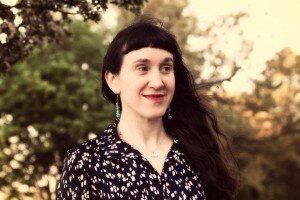Saba Razvi’s poetry collection, (Finishing Line Press, 2012), makes it apparent that Razvi is a searcher, one who welcomes a journey.
Along Razvi’s journey, she discovers connections between the physical world and the spiritual one that exist, sometimes darkly, in nature. Trees float through the ether, rootless; the moon is described as not “sickle sweet”; the river, an imposter (“not stream nor sea”). We saunter along with her through demonic deserts and cliff ledges, looking for home. Home is a million miles away but we heave onward. Each step brandishes another mirror held up to our human face: we are, at the base, animals, finicky and trapped.
Like animals, sensory perception and instinct reign over logic. Razvi’s text promotes exquisite synapse explosions of all five senses. We see “sorrow, purple as a plum.” We hear “the laughter of carnival in the distance,” and the “night breeze thrumming.” We consistently smell sandalwood, and myrrh (two influences often alluded to in this collection). We feel toes “nibbled away by the iridescent-eyed, scaled bodied because there is littlewhere left to go.” We taste the “rock sugar candy”- each phrase and word a pop of sweetness. These poems promote meta-physical connections by appealing to our senses through earthy sensuality.
In one of my favorite selections, “The Bitter Tree,”
“There is no leaving from under the leaves of The Bitter Tree, shadow-spilling inky a perimeter around the base of snake-roots. There is no leaving from under the sounds of beating, not wings, not think bodies but the beating pulse of heart…The hungry hunkered creatures cannot discern the scent of me from flesh- fruit.”
The bitter tree grows and grows, and then we are subsumed within its bark; nothing nurturing makes it out alive. If negative or violent emotions grow from root to trunk to closed fists, then loss is an absent bird egg. In “At the Lotus Tree Beyond Which There is No Passing,”
“…a pearl crowning the branches, resting, instead of a bird’s egg, a round lens of a pair of eyeglasses, lens of my mother’s mother, through which I can see her across dimensions of existence.
“Her silence like colored stones, glimmer in the lights’ stealthy song. And. In those sounds, the eyes of girl, widow, mother, long lost daughter, sister, woman, leaving love of the body long behind.”
Our eyes unravel Razvi’s depictions of female lineage: soft hands, completing tasks, silken skin, blood cells, mitochondria. The tiniest pieces of ourselves, our hearts, are everywhere among the sky, the trees, the lakes. We look for our lost loved ones both literally through taking steps but also by making demands: demands to stow away nostalgic objects, such as writing tools or pressing the delicate petals of a lotus flower and we strive to heal — somewhere, somehow.
In keeping with these ideas of movement and the retention of valuable artifacts, both “Chalked Circles and Circumferences of Breath” and “Cartographer of Fires,” order the reader to travel but return home. (We, the readers, are willing nomads now.) In the first, “Chalked Circles…” Razvi instructs:
“Find me a shelf of colored bottles, a votive for a loved’s grave, a silent room with tables waiting for a hot cup or a clean glass.”
“Find me a colorless flag full of flagpoles mined from every step between, threaded knotted as many times as steps.”
Her words are riddle-like but this surreal scavenger hunt hits home, literally, with the last instruction:
“Find me a sheaf of colored pages, a bloom for a baby’s crib, a silent room with a warm cup, awaiting tables.”
Perhaps the worldly searching is just to solidify the physical homecoming, sitting in a safe, quiet room, a family built. I love the repetition of the cup symbol as well: this object of comfort, fullness, and nourishment.
Of the Divining and the Dead possesses such delicate thematic coherency of seeking, altering, yet returning to what is most deeply cherished. The journeys in our mind, as facilitated by Razvi’s words, are fantastic — the colors explode on the page. You see the poems unveil like a fairy tale. The domestic mixes with the untamed, connotes ideas of Darwinism, evolving into a new chapter of believing and becoming. An example of such becoming occurs when a new shade of blue is created in “Aggregate:”
“Hello dear futurebaby, curled up like a lapis lizard, lazuli as blue and flecked with gold in my mind’s third eye.”
The baby possessing “unshed gills” is brilliant:
“Sound as a bell you are still in the far belly of a violet light. Light your unshed gills on fire, darling, and spread like quickest silver through my eyelids…”
The sensory perception in this collection is majestic. I could see the miniature stories and felt, at times, like I was experiencing them firsthand. But then Razvi’s words, like images connected to marionette strings, get pulled off stage, only to reappear as unexpected objects or ethereal emotions we cannot quite place. We are left to explore the words new, curving trajectory.

is the author of three chapbooks: Every Her Dies (ELJ Publications), Clotheshorse (Finishing Line Press, forthcoming 2014), and Backyard Poems (Dancing Girl Press, forthcoming 2015.) Her work has been nominated for Best of the Net and has appeared in public places in Iowa City. Recent work can be seen / is forthcoming at Dressing Room Poetry Journal, Toad Suck Review, Red Savina Review, Toad: the Journal, The Poetry Storehouse, Quail Bell Magazine, Flapperhouse, and Hobart. She also writes for Insecurity Ragazine.

